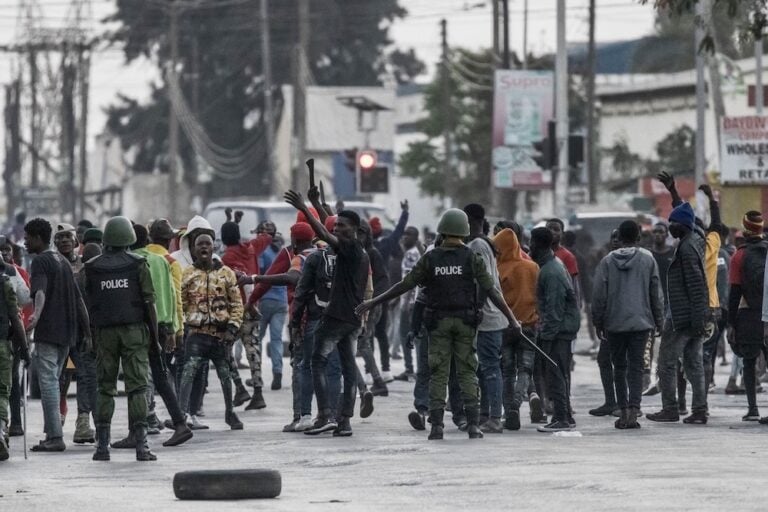(MISA/IFEX) – On 3 March 1999, Zambian police briefly detained three foreign journalists after residents of Lusaka’s Chilenje township apprehended them for filming in the area. Three other journalists were later also detained, this time by soldiers, while pursuing a story on a water crisis in the capital, Lusaka. Police confirmed that two Zimbabweans and […]
(MISA/IFEX) – On 3 March 1999, Zambian police briefly detained three
foreign
journalists after residents of Lusaka’s Chilenje township apprehended
them
for filming in the area. Three other journalists were later also
detained,
this time by soldiers, while pursuing a story on a water crisis in the
capital, Lusaka.
Police confirmed that two Zimbabweans and Zimbabwean-based British
journalist Chris Bishop were taken and detained at Chilenje police
station
until mid-day on 3 March. Lusaka police division commanding officer
Benson
Mayonda explained that the incident happened when residents got
suspicious
after seeing the three journalists who were doing work for the South
African
Broadcasting Corporation (SABC).
“With what has been going on, the people themselves found the
journalists
taking pictures and got suspicious and handed them to the police,”
Mayonda
told the State-owned “Zambia Daily Mail” newspaper. According to the
police
chief, the three were held for about one hour and later released after
their
real identities were established.
In a related development, soldiers guarding a water works installation
in
the same area detained and harassed three journalists from the
state-owned
“Times of Zambia” newspaper who were pursuing a story on the shortage of
water in the Zambian capital.
The “Times” reported that reporter Chris Mfula, photo-journalist Rejoice
Lukumba and driver Henry Phiri were apprehended and detained in a cell
for
about one hour before being released. The soldiers confiscated their
identification cards, film and an audio tape which they said could be
collected the following day.
The journalists who were arrested and later released were covering the
aftermath of the bombings in the Zambian capital on 28 February by
unknown
people. Both foreign and local journalists had gone to Chilenje
specifically
to cover the water crisis in the capital following the bombing of the
main
water supply system which supplied water to nearly two million
residents.
On 3 March, the Zambian minister of information, Newstead Zimba, who is
also
the chief government spokesman, accused the SABC of fabricating stories
about Zambia. He was reacting to SABC television reports earlier which
quoted him as allegedly attributing the weekend bombing in Lusaka to the
Angolan Unita rebel movement. He denied ever having said this, adding
that,
in all the statements he had given, there had been no mention of Unita
either directly or by implication and described the report as a
“complete
fabrication”.
On 4 March, in a statement the Zambian government warned journalists in
the
country against abusing press freedom to disseminate false and
misleading
information that could endanger the country’s security.
The warning followed a statement by Zambian journalist Jowie Mwiinga to
the
SABC claiming that the government might have planted the bombs that
destroyed water and electricity installations in the capital in order to
divert attention from the current impasse with Angola.
Mwiinga, a corespondent for Reuters News Agency, is said to have told
Bishop of SABC television in Lusaka: “The Chiluba government may have
planted the bombs to divert attention from the current difference with
Angola.”
“Journalists should not seek to make money or indeed cheap professional
mileage from false information,” the government warned in a statement.


